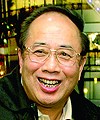| Home / Culture | Tools: Save | Print | E-mail | Most Read |
| Foreword |
| Adjust font size: |
I had never imagined that I would one day be the co-author of a book about a topic like the present one. Without the congenial discussion between Dr. Luis Palau and myself, there would not have been the proposal that we join hands to put out this book. Prior to my three dialogues with Dr. Palau, I only knew that I was one of the numerous atheists in China and that my thinking about religion was no different from that of my family members, colleagues and friends. Dr. Palau is a theologian and a religious leader in the United States. He is knowledgeable, honest and warm-hearted. I respect him. An atheist carrying on a dialogue with him should be a philosopher, one who is well versed in theories related to religion. I, however, have only taken a philosophy course in college, though I often liked to think philosophically during my life-long career-over 20 years doing scientific research and about an equal number of years as a civil servant. As a result, during our eight hours of dialogue, I simply conveyed my thoughts about religion in general and God in particular in a straightforward way. As I had no theological training previously, I did not use any religious terminology during our conversations. In the course of our dialogue, I referred to the "Discourse on the Bridge of the Hao River", a familiar story from the Chinese classics, and said that Dr. Palau might find it very difficult to appreciate the feelings of an atheist. As a matter of fact, I myself had difficulty in understanding his feelings too. Through our dialogue, I did overcome somewhat my initial concern about the difficulty of communicating between people with different cultural backgrounds. I now believe that in-depth understanding is possible as long as there is a will to communicate, unlike the situation existing between the two sages on the one hand and the fish on the other in the "Discourse on the Bridge of the Hao River." They could never communicate. I have reread the entire text prior to its publication. I have discovered that my trend of thought and Dr. Palau's are quite different. While he believes that the laboratory verifying the existence of God lies in our heart-in other words, when the heart affirms God's existence, one will be able to communicate with him-I believe that this laboratory exists independent of our heart and only when we have verified the existence of God can we communicate with him. This is the cause of the divergence of views on various important matters. I do not bank on readers agreeing with the views expressed in this book, but I do look forward to their agreeing with the approach both of us adopted when conducting this dialogue. I understand that in some countries and regions, people sometimes look upon the terms "theists" (those who believe in God) and "atheists" (those who don't) with suspicion. Dr. Palau and I overcame the disparagement and obstacles often associated with them and thus were able to turn the discussions, which could have been sharply conflicting, into a two-way street of mutual understanding. We all like the word "harmony." Who could say that inter-personal harmony would not be beneficial to achieving harmony among people of different countries, ethnicities and beliefs! What this book hopes to convey is the conviction that this commonality will enable us to transcend many of the differences and even the misunderstandings among us. |
| Tools: Save | Print | E-mail | Most Read |
 |
| Related Stories |

